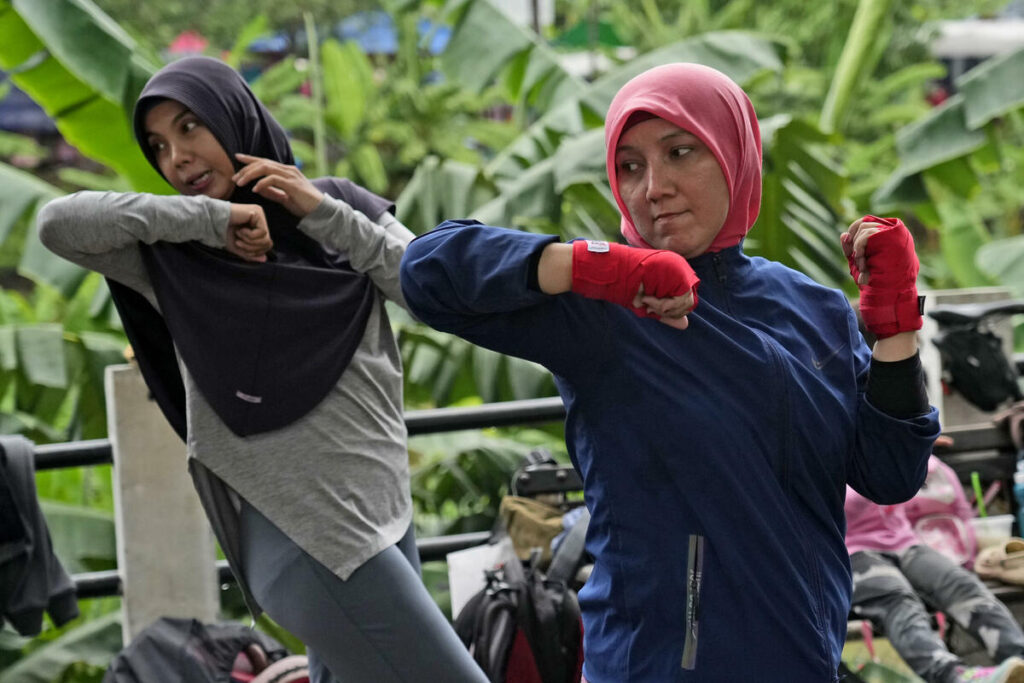The mental and physical abuse she endured during her 11-year marriage led Rani Miranti to join a fight club that trains in martial arts.
Miranti is one of a growing number of Indonesian women taking self-defence classes in Indonesia, the world's most populous Muslim-majority country, where gender-based violence is a major challenge.
“State protection usually comes after violence has occurred, and you never know when it's going to come,” said the 38-year-old single mother of three. “Unfortunately, if you're suddenly attacked, no one can help you, so you have to be able to defend yourself,” she noted.
The National Commission on Violence Against Women, “Komnas Perempuan,” recorded 289,111 cases last year, a drop of about 12 percent compared to 339,782 cases in 2022, when the Sexual Violence Law was passed.
But the committee suggested the latest data was just the “tip of the iceberg” of gender-based violence, with the actual number likely being much higher, according to Komnas Perempuan's 2023 annual report released in March.
The report said a large number of cases go unreported due to several factors, including victims' lack of access to complaint services, weak case recording systems and high levels of societal stigma against victims of violence.
In 2022, Indonesia's parliament approved far-reaching legislation that provides criminal penalties for gender-based violence and guarantees compensation and other remedies to victims and survivors.
The law was passed on Sunday after Indonesia's High Court sentenced the head of an Islamic boarding school to death for raping at least 13 girls over a five-year period, impregnating some of them. The girls were between 11 and 14 years old and the systematic rapes sparked a public outcry that the headmaster had not been arrested sooner.
Indonesia's election commission removed the president from office in July after finding him guilty of sexual assault following a complaint from an official, the latest in a series of high-profile cases of violence against women in the island nation of more than 277 million people.
As the number of incidents rises, Indonesian women and girls who fear physical violence are turning to alternative ways to protect themselves, such as self-defense classes and clubs.
For Miranti, who was repeatedly beaten and physically abused by her husband, Muay Thai is the best form of self-defence as it helps her develop the skills, confidence and technique to fend off attacks.
Donning a red hijab and boxing gloves, the teacher at an Islamic primary school in Jakarta demonstrated striking techniques on a sparring partner as part of training at a mixed martial arts course in Jakarta that she enrolled in two years after deciding to leave an abusive marriage in 2018.
Muay Thai, which originated in Thailand, is a type of kickboxing that includes strikes with the knees, elbows, feet and fists.
“Now I have the tools, I have the techniques to fight back,” Miranti said, “but more importantly, I've learned to avoid situations by being more aware of my surroundings.”
Miranti's trainer, Rahimatul Hasana, said she was overwhelmed by the growing demand, especially from women wanting to learn the martial art in private training, as female Muay Thai instructors are hard to find.
“Many may not feel comfortable being taught by a man or may need private lessons in their own home,” she added.
Most of the women who took her self-defense classes were shy, and some had previously been victims of abuse, she said.
“Learning physical self-defense not only gives you the tools to control your reactions to negative situations, it also builds your confidence in your mental defenses,” Hasana said.
Her husband, professional mixed martial artist Rizal Zurmi, said the growing trend of women learning martial arts shows thugs and criminals that “not all women are easy prey.”
“Martial arts have recently become popular among women,” said Zurmi, who has won more than 30 medals in regional, national and international competitions.
Rangi Birantika Sudrajat, an Indonesian woman who took the mixed martial arts class, said that her physical training has best helped her in her job as a general physician with Doctors Without Borders.
The 31-year-old doctor, who has worked in refugee camps in Pakistan, Yemen, South Sudan, Bangladesh and Sierra Leone, said martial arts not only built her confidence and physical strength but also helped her manage stress.
Andy Gentrijani, chairman of the state Commission on Violence Against Women, welcomed the increase in women taking self-defence classes.
Types of domestic violence recorded include attempted rape, marital rape, forced abortion and incest. Most of the victims are female students aged 18-24, and most of the reported perpetrators are their former or current male partners.
Gentriani said nearly all of the victims were younger and less educated than their perpetrators, suggesting that violence against women often involves a power imbalance.
He said more people reported sexual harassment in 2023, a year after the Gender-Based Violence Law was passed. His committee received about 800 reports of online and physical sexual harassment and 200 reports of rape last year.
“In our society, many still believe that cases of sexual violence are shameful and embarrassing for female victims,” Gentrijani said, and many families choose not to report the incident. “There are still many cases where victims are silenced, including in cases of violence against women,” she added.
( beta )

